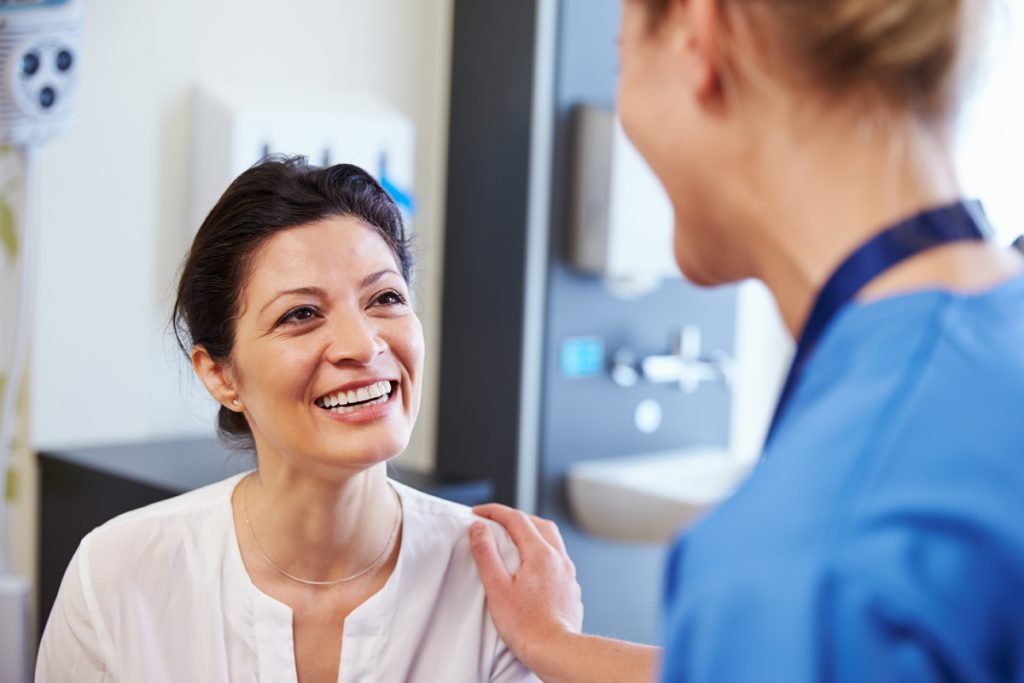There’s a saying: A stitch in time saves nine. That kind of thinking applies to health care, too.

A health screening can uncover a problem that might easily be treated, if it’s caught early on, said Dr. Sabine Shaffer, who practices internal medicine and pediatrics at the UCHealth Primary Care Clinic – Chapel Hills in Colorado Springs.
She likes to see patients from childhood to adulthood and into their golden years, she said. She appreciates having that long-term perspective on their health care.
A graduate of the University of Colorado Medical School, Dr. Shaffer has done stints in other countries but calls Colorado home.
On her profile, she notes that she’s “interested in helping people with preventive health, women’s health (and) helping people stay active and keep their quality of life.”
And that’s where health screenings come in.
Although health screenings don’t always tell the whole story – “nothing is ever perfect,” she said, they do offer perspective.
“There is some benefit to following people over time. That’s why having an annual physical is so important,” she said. For example, “being able to compare a mammogram from two years ago to the present one helps us pick up on things a little quicker. You get an extra edge by having some history to compare it to.”
Not everything is obvious, so comparing current conditions with past health screenings “can help with diagnosis,” she said. “That’s why preventive care means coming in to see your doctor every year. “
Which health screenings are particularly effective in identifying health issues?
Pap smears
“I think the biggest one we do for younger women is the pap smear,” she said. The test, which detects cervical cancer, is particularly effective. “The way cervical cancer behaves, if you’ve kept up with your pap smears, you’re going to catch it in time. The regimen now is pretty good and generally we can catch it before it’s something you can die from.”
Some health screenings, like pap smears, are somewhat unpleasant, so people tend to put them off.
“It’s human nature” she said. “I do that too!”
There are some very accurate health screenings for many fairly common diseases, such as diabetes, colon cancer and breast cancer, she said.
Colonoscopies
“Colonoscopies are good at detecting problems,” she said. “If you catch it early, the treatment can be quite successful. If you wait till you have symptoms, it’s really too late … you’re in a whole different treatment category.”
Mammograms
Mammograms have become a lot more accurate in recent years, she added. “Early detection is key to treatment and survival.”
About half the women who are diagnosed with breast cancer caught it because of a routine health screening, she said.
In recent years, some insurance companies have fought to eliminate what they deemed “unnecessary” health screenings, but Shaffer finds that most companies will approve a screening if the doctor thinks there is a viable reason for doing it.
“Sometimes you have to go to bat for a patient if they fall outside the norm, but if you have a good reason, most will comply,” she said. “If you get routine blood work more than once a year, for example, they might fight it.”
Most companies today seem to consider it a useful tool for prevention, she added.
Again, the annual checkup is the time to consider which health screenings are important for each patient.
Other health screenings

“If you check things like blood pressure, cholesterol, glucose levels and such and keep track of them over time, you may detect a problem.”
Take the bone density test, for example.
The standard recommendation is that patients be given a bone density test at about age 65, “but by the time you’re 65, you’re dealing with the results of not taking good care of your bones. There is some benefit in screening sooner, especially if you have family history of osteoporosis.”
Other considerations
Family history is really important, she said. Patients need to let their primary care physician know about family health histories. And physicians need to ask questions like “How old were your parents when they died? What did they die from? Do you have diabetes (or other disease) in your family?”
Lifestyle factors in, too.
“For smokers, there’s a whole different set of concerns, especially in males, when they turn 50, they need to be screened for aortic aneurysms and also for lung cancer. All smokers who have smoked for 22 years or more also need to get a high-resolution CT scan by age 55, checking for lung cancer, she added.
Genetic testing
How does she feel about health screenings that tell a woman if she will be prone to getting breast cancer?
“I think that’s got to be done on a case-by-case basis” she said. “If there’s a pretty significant family history, it might be worth knowing. If you have no family history, do we really want to test for it?”
That, and other genetic tests, should be a topic of conversation with your personal physician, she said.
“You know yourself best and hopefully you can work with a physician who can help you figure out what you need. Maybe you’re just nervous about a certain disease.”
She sees genetic testing as having more of a role in preventive medicine in the future.
“I think there are a lot of doctors who, in 10 or 20 years, will use genetic testing not just to predict which diseases you might get, but also what medications might work best for you.”
The best way to stay healthy is to establish yourself with a health care provider you see on a regular basis, she said.
“Talk about what risks you have as part of your annual visit,” she said. Prevention “is the majority of what I do. It helps to find things earlier, when you can actually do something about it.”
